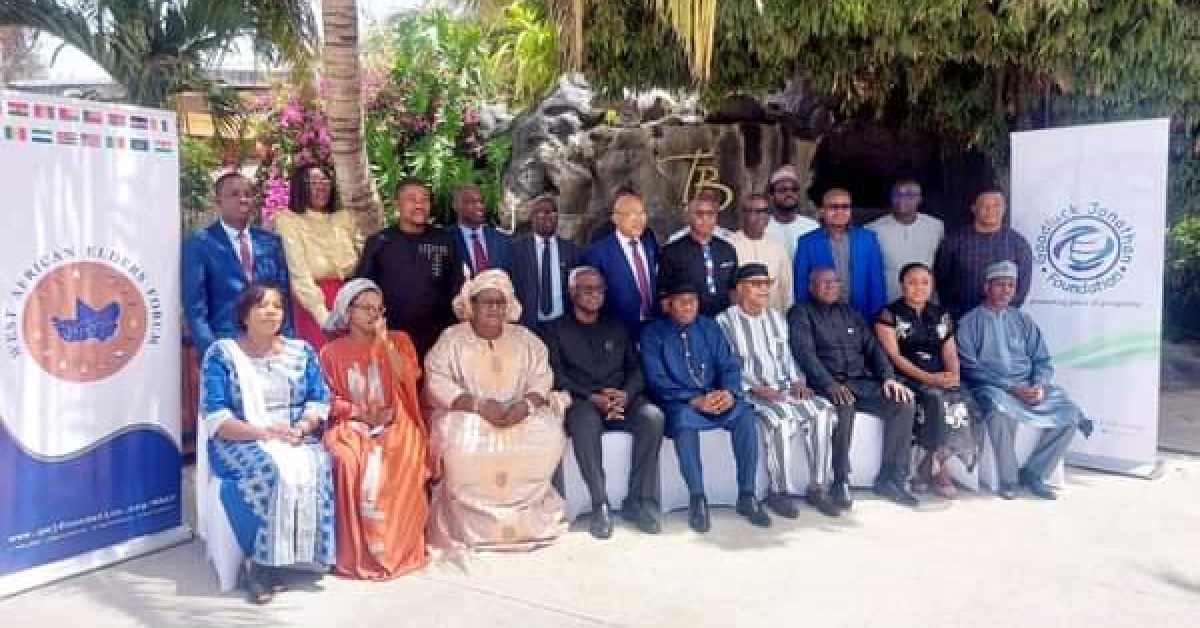The West Africa Elders Forum, WEAF last week held a two day dialogue in Dakar Senegal where they discussed peace, security and democracy in the subregion.
The event was inspired by recent reversals in democratic good governance and so the Forum, which was established by Goodluck Jonathan Foundation, draws on the rich experience of former Presidents and statesmen who have a towering reputation in upholding and promoting democracy, good governance, peace and security in West Africa. They statesmen are playing advisory, advocacy and mediating roles in the pursuit of ECOWAS’s objectives of peace, democracy and economic development. Ecowas – Cedeao

President Goodluck Jonathan served as Vice President and later as President of Nigeria during which he made considerable efforts to build governance institutions. During his tenure he was active in several ECOWAS mediation efforts in troubled parts of West Africa. The high point of this endeavour was when he contested for his second term but conceded even when the outcome was widely regarded as contestable, and peacefully handed over the reins of power. Goodluck Jonathan was famously quoted as saying, “my political ambition is not worth a single drop of blood of any Nigerian”.
President Ernest Bai Koroma of Sierra Leone who served his country as President from 2007 to 2018, has similarly distinguished himself as an epitome of democracy, good governance and peace consolidation. He presided over an election that was widely acclaimed as transparent, free and credible and handed power over to the opposition after successful peaceful elections. He refused to tamper with his country’s constitution to run for a third term despite pressure from internal and external factors for him to continue.

It is therefore not out of place that Ann Iyonu, the Executive Director of the Goodluck Jonathan/WAEF Secretariat, said “the forum is homegrown and a non-partisan platform of past Heads of State of West Africa and it is established to draw on their experiences in promoting peace security and democratic initiatives.”
WEAF, she said, nurtures active collaboration with bodies like Ecowas.
Ann stated that the West Africa subregion had an unenviable reputation as a chronologically unstable region in the world from early 1990 characterised by political authoritarianism, military and single-party rule, the suppression of human rights and the abridgement of the freedom of association. She added that “but the region later ascended to full-scale electoral pluralism based on multi-party political competition and constitutionally guaranteed human rights, civil liberties and political freedoms.”
In response to the view that ECOWAS is not doing much to sustain peace and democracy in the subregion, President Jonathan said, “The perception that ECOWAS is not doing much needs to be corrected, as several efforts by the Commission which, at times, involved sitting heads of states have averted and in some instances de-escalated some conflicts and unconstitutional changes in government. This was the case for Niger, Guinea, the Gambia and Guinea.”
Former President Jonathan further noted “However, we need to accept and agree that there is room and the need to do more. As we move on and in the future effort, we would gradually adopt and implement some of the recommendations put forward as solutions to some of the crises currently experienced within the sub-region.”

Dr Mohamed Ibn Chambas once headed ECOWAS and UNOWAS, both of which are geared toward strengthening peace and security but also supporting the consolidation of democratic principles within their spheres of influence. He said, “It is always difficult to celebrate and amplify the results of preventive diplomacy as such efforts are normally quiet. Efforts have always been made, sometimes even by sitting heads of states to dissuade their colleagues from the narrow oath if constitutional manipulation, but such efforts have largely been rebuffed by the actors involved.”
During the event, the discussants broke up into panels and deliberated on a wide range of themes including the “Background Context and Setting the scene: Recent Challenges to West Africa’s Democratic Progress and Advancement”; “Drivers of the Third Term Impulse in West Africa’s Democracies”; “The Return of Military Coups to West Africa”; “Short and Medium Term Responses to Unconstitutional Changes of Government in West Africa”; Longer-Term Responses to the Unconstitutional Challenges of Government in West Africa” and Revamping and Harnessing Sub- Regional Continental Responses to the Unconstitutional Changes of Government in West Africa.
President Koroma, who on behalf of WAEF provided closing comments stated that the recommendations coming out of this two-day event would be submitted to the relevant institutions and be followed upon to ensure that they are not abandoned on some backburners.



 Post a comment
Post a comment









Comment(s)
Disclaimer: Comments expressed here do not reflect the opinions of Sierraloaded or any employee thereof.
Be the first to comment